Yes, it is possible to install solar panels on a mobile home, but it comes with unique challenges and considerations. As interest in renewable energy surges, mobile homeowners in California and beyond are increasingly exploring the potential benefits of solar power. The question, “Is it possible to install solar panels on a mobile home?” is crucial for those seeking energy independence, reduced electricity bills, and environmental benefits.
Harnessing solar energy is not just a trend but a sustainable practice that can dramatically lower energy costs and reliance on traditional power grids. For mobile homeowners, this can mean enhanced energy efficiency and financial savings. However, the feasibility of installing solar panels on a mobile home hinges on factors like structural integrity, local building codes, and available installation space.
Challenges and Considerations for Solar Panel Installation on Mobile Homes
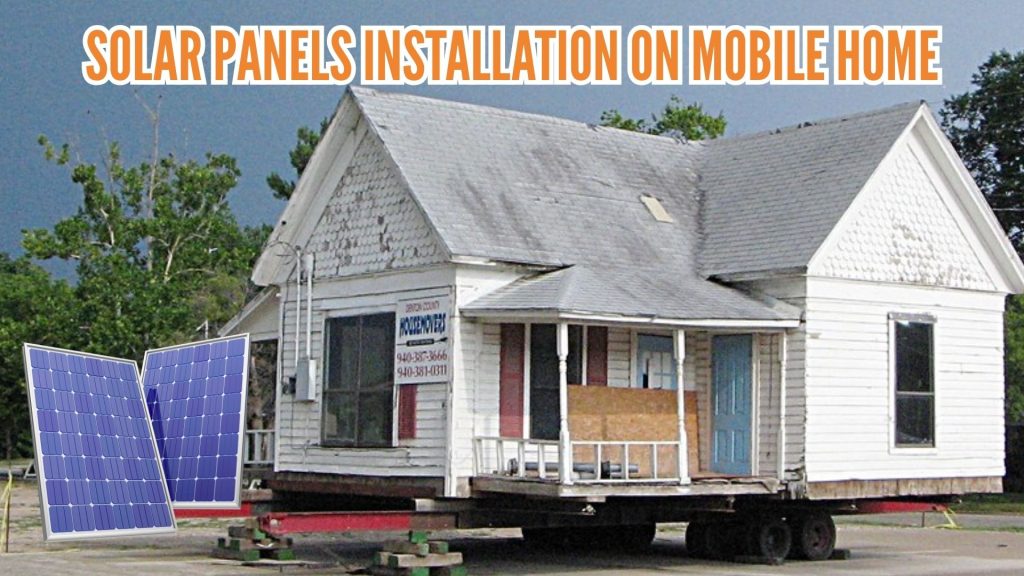
Mobile homes present unique challenges when it comes to installing solar panels due to differences in structure, age, and design compared to conventional homes. These challenges can affect both the feasibility and efficiency of a solar installation.
1. Structural Challenges
One of the most significant factors is the structural integrity of the mobile home’s roof. Many older mobile homes were not designed to support additional weight beyond basic roofing materials. This can be problematic, as traditional solar panels can add substantial weight, often ranging between 100 and 200 pounds per panel. Newer mobile homes, particularly those built after 1990, may have sturdier roofs that can handle this load more effectively.
The type of roof also matters. Mobile homes with flat roofs may not be able to utilize traditional mounting systems that require a tilt for optimal solar energy capture. In contrast, pitched roofs that meet certain slope requirements are more suitable for effective solar installations. Additionally, roofs with metal or thin framing may require structural reinforcement, which adds to the installation cost and complexity.
2. Permanent Foundation Requirements
Most building codes specify that any structure intended for solar panel installation must be on a permanent foundation. Mobile homes, however, are often designed to be moveable and may rest on temporary or non-permanent foundations. This factor can lead to restrictions or require specific approvals from local authorities. Without a permanent foundation, solar panels can typically only be installed using ground-mounted systems or on auxiliary structures like garages or outbuildings.
3. Age of the Mobile Home
The age of the mobile home is another crucial limitation. Mobile homes constructed before the 1976 implementation of the HUD Code may lack adequate structural support and electrical systems compatible with solar installations. These older homes often require significant retrofitting to meet safety and building standards. In contrast, newer models that adhere to updated HUD standards may have better framing and enhanced electrical setups that can accommodate solar panels.
4. Material and Framing
The construction materials used in mobile homes can impact solar panel installation. Mobile homes typically have lighter framing materials, which are more susceptible to structural strain under the weight of mounted panels. For example, wooden roof trusses in older models may not be spaced or sized adequately to hold the additional weight. Upgrades or assessments by professional installers can help determine whether reinforcements are needed.
5. Electrical Compatibility
An often overlooked aspect is the mobile home’s electrical system. Older mobile homes may not have electrical systems that support the integration of solar technology. This can necessitate upgrades to ensure compatibility with solar inverters and other electrical components. For mobile homes connected to a shared or community power grid, additional coordination with utility providers and compliance with regulations are essential.
6. Space Limitations
Space is another limitation, as mobile homes tend to have less roof space than traditional homes. The limited area can restrict the number of solar panels that can be installed, thereby capping the potential energy output. In such cases, homeowners might need to consider high-efficiency panels or supplemental ground-mounted systems.
7. Alternative Solutions
If the roof is unsuitable for solar panels, ground-mounted solar panel systems provide a practical alternative. These can be placed in open areas and adjusted for optimal sunlight exposure, making them ideal for mobile homes with space limitations or weaker roofs.
Choosing the Right Solar Panel System for Your Mobile Home
When considering solar panel systems for mobile homes, it’s essential to understand the different installation options available. Each system type comes with its own set of benefits, challenges, and suitability based on your home’s structure, location, and energy needs.
1. Roof-Mounted Systems
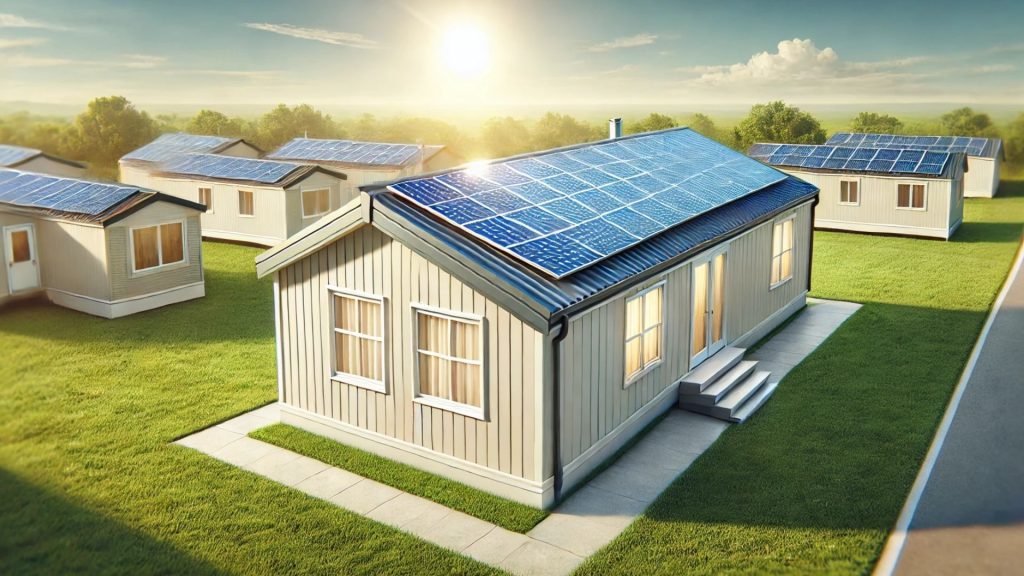
Roof-mounted solar panel systems are among the most common options for mobile homes. This system type involves securing solar panels directly to the roof, which can be an efficient use of space and cost-effective in terms of installation. However, mobile homes need to meet specific structural criteria to support the added weight of these panels safely.
Benefits:
- Space Efficiency: Utilizes existing roof space without taking up additional yard area.
- Direct Sunlight Access: Maximizes exposure to sunlight, especially if installed on a south-facing roof.
- Lower Installation Costs: Typically less expensive than ground-mounted systems due to simpler mounting infrastructure.
Considerations:
- Roof Strength: Not all mobile home roofs can bear the weight of conventional solar panels. Thinner roofs or those without adequate support may require modifications or limit the type of panels that can be used.
- Age of the Home: Older mobile homes may require structural assessments to determine if reinforcement is necessary.
2. Ground-Mounted Systems
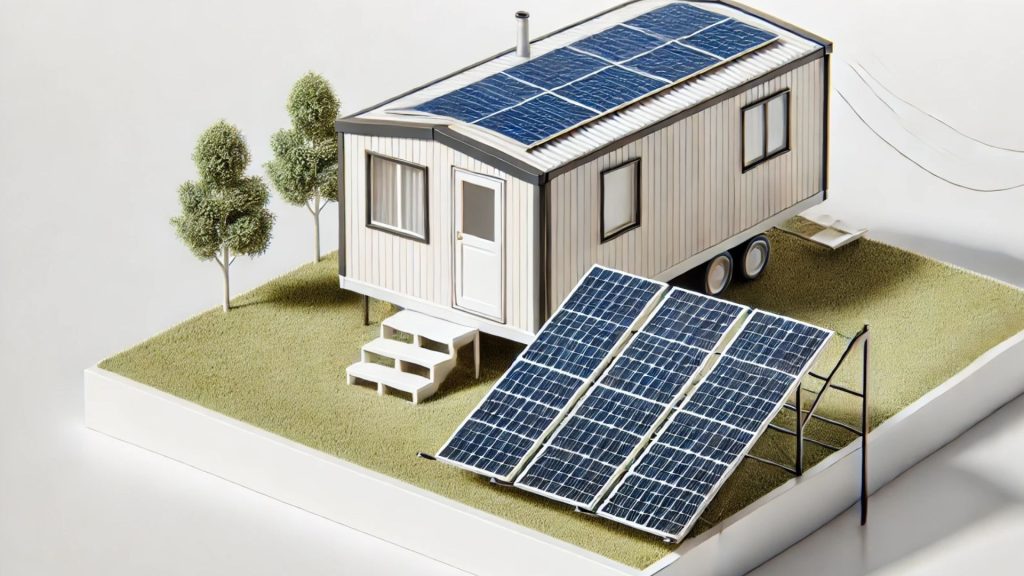
For mobile homes with limited or unsuitable roof space, ground-mounted solar panel systems present a viable alternative. These systems involve installing panels on a frame or structure set on the ground. Ground mounts provide flexibility in placement and orientation, making them ideal for maximizing sunlight exposure.
Benefits:
- Customizable Orientation: Panels can be angled and positioned for optimal sun exposure, improving overall energy production.
- Reduced Structural Load: The roof’s weight-bearing capacity isn’t a concern, making ground mounts a practical option for older or weaker mobile homes.
- Ease of Maintenance: Panels are more accessible for cleaning and repairs.
Considerations:
- Space Requirements: Ground-mounted systems need ample yard space that is free of shading and obstructions.
- Higher Installation Costs: Typically more expensive due to the need for additional mounting structures and site preparation.
3. Portable Solar Panel Systems
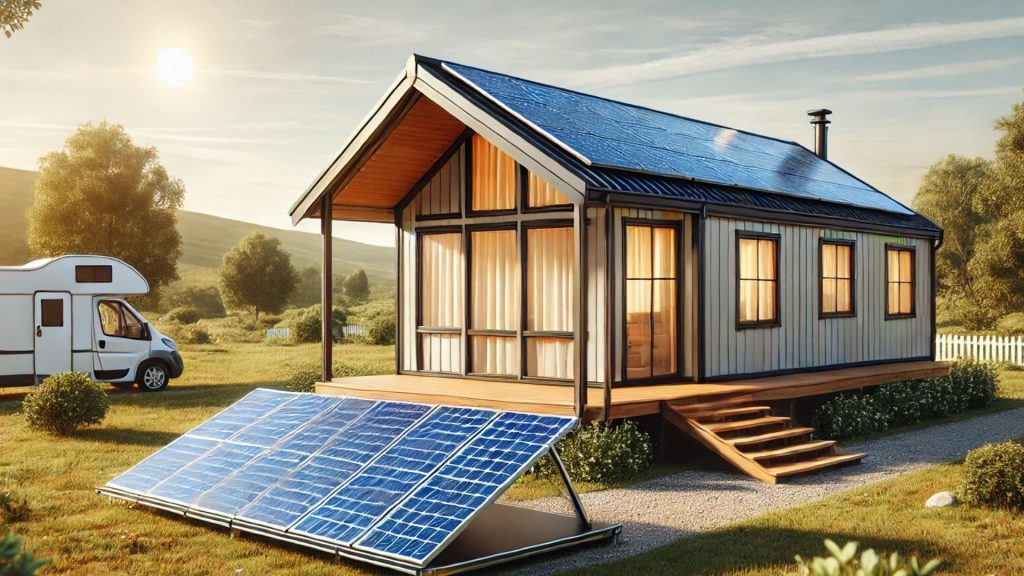
Portable solar panel systems are lightweight, flexible solutions designed for easy transportation and temporary setups. These systems are ideal for mobile homeowners who are renting or frequently move their homes, as they do not require permanent installation.
Benefits:
- Flexibility: Can be moved and positioned as needed, providing energy wherever there is ample sunlight.
- No Structural Concerns: Portable panels do not require attachment to the home’s roof, bypassing potential structural limitations.
- Simplicity: These systems are often plug-and-play, requiring minimal setup and technical knowledge.
Considerations:
- Limited Power Output: Portable panels may not produce enough energy for significant power needs, making them better suited for supplemental or backup power.
- Seasonal Efficiency: The performance of portable systems can vary based on positioning and seasonal sun exposure.
4. Thin-Film Solar Panels
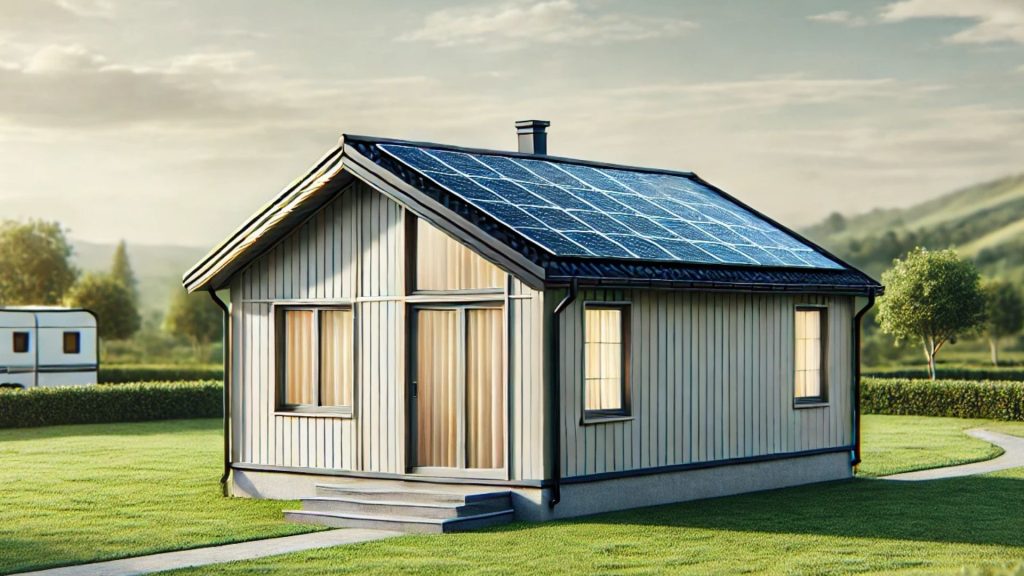
Thin-film solar panels are a newer technology that can be especially beneficial for mobile homes with older or less structurally sound roofs. These panels are lighter than traditional crystalline panels and can sometimes be integrated directly onto the roof surface.
Benefits:
- Lightweight: Thin-film panels exert less pressure on the roof, reducing the need for structural modifications
- Flexible Application: They can be applied to a variety of roof types, making them suitable for unconventional structures.
- Aesthetic Appeal: Thin-film panels are less obtrusive and can blend more seamlessly with the roof’s design.
Considerations:
- Lower Efficiency: Thin-film panels typically have a lower efficiency rate compared to monocrystalline or polycrystalline panels.
- More Panels Required: Due to their lower efficiency, more panels might be needed to generate equivalent energy, potentially taking up more space.
Important Guidelines for Solar Panel Installation on Mobile Homes
Installing solar panels on a mobile home involves more than simply selecting a system; it requires careful planning, adherence to regulations, and professional assessments. Here are the primary factors to keep in mind to ensure a successful and compliant solar panel installation on a mobile home:
1. Structural Assessment
Before embarking on the installation process, it is essential to assess the structural integrity of the mobile home’s roof. Unlike conventional homes, mobile homes may have thinner roof trusses and lighter framing, which could limit the roof’s ability to support the added weight of solar panels. An evaluation by a licensed structural engineer or a solar installation expert can help identify any necessary reinforcements or modifications to support the panels safely.
2. Building Codes and Permits
Compliance with local building codes and regulations is a critical part of the installation process. Mobile homes often face stricter regulations, particularly if they do not have a permanent foundation. The requirements for solar panel installations vary by city, county, and state, so it’s essential to consult with local authorities or experienced solar providers to understand and meet all necessary legal standards.
Key Points to Consider:
- Foundation Type: Some areas may mandate that solar panels can only be installed on structures with permanent foundations.
- Permit Requirements: Acquiring the proper permits ensures compliance with safety and construction codes. Failure to do so can result in fines or the need to remove the installation.
3. Energy Needs and System Size
Determining the size of the solar system starts with evaluating the energy consumption of the mobile home. Factors to consider include household size, types of appliances used, and typical energy consumption patterns. Understanding your energy needs helps in choosing the right number and wattage of panels. Most mobile homes might require between 6 to 12 panels to offset electricity use effectively, depending on their power consumption and panel efficiency.
Calculating System Requirements:
- Daily Energy Usage: Calculate average daily energy consumption by reviewing utility bills.
- Sunlight Availability: Take into account the peak sunlight hours in your location. California, for instance, benefits from abundant sun exposure, making solar a highly efficient energy source.
- Panel Efficiency: High-efficiency panels might be necessary if roof space is limited.
4. Orientation and Tilt Angle
For maximum energy production, solar panels should be installed at an optimal angle and orientation. In the Northern Hemisphere, south-facing installations are ideal, as they capture the most sunlight throughout the day. The angle of the panels should match the latitude of the installation site to optimize energy output. However, mobile home roofs that are flat or have minimal pitch may need additional mounting structures to achieve the correct angle.
5. Shading and Obstructions
One of the most significant factors affecting solar panel performance is shading. Before installation, evaluate the site for potential shading issues from nearby trees, buildings, or other structures. Even partial shading can significantly reduce the energy production of solar panels. Ground-mounted systems offer an advantage here, as they can be placed in open areas free from obstructions.
6. Installation Method
The method of installation plays a role in the overall success and durability of the solar system. Roof-mounted systems may require specialized mounting hardware, especially for homes with non-standard roof materials or older structures. In contrast, ground-mounted systems involve building a frame that secures the panels and allows adjustable tilting.
DIY vs. Professional Installation:
While some homeowners may consider DIY installations to cut costs, hiring a professional ensures compliance with safety standards and maximizes the efficiency and safety of the syste. Professionals also have the expertise to navigate local permitting processes and can offer warranties on labor and equipment.
7. Electrical System Integration
Connecting the solar panels to the home’s electrical system involves installing an inverter to convert the direct current (DC) generated by the panels into alternating current (AC), which powers household appliances. For mobile homes, especially older models, this may require upgrades to the electrical system to handle the additional power source and meet safety codes.
Backup and Grid-Tied Options:
- Off-Grid Systems: Useful for remote mobile homes not connected to the main power grid. These require batteries for energy storage.
- Grid-Tied Systems: Provide the option to sell excess energy back to the utility company, reducing net electricity costs.
8. Cost and Financial Considerations
Initial costs can vary widely based on the type of system (roof-mounted, ground-mounted, or portable), required structural modifications, and permit fees. However, federal and state incentives, including tax credits, can significantly reduce upfront expenses.
Why Solar Panels Are a Smart Investment for Mobile Homes
Embracing solar energy for mobile homes presents a myriad of advantages that go beyond simply cutting utility costs. While mobile homeowners may face unique challenges during installation, the benefits make solar a worthwhile investment. Here’s an in-depth look at why mobile home owners should consider solar panels:
1. Significant Reduction in Energy Costs
One of the most compelling reasons for mobile homeowners to install solar panels is the potential for significant energy savings. Solar panels convert sunlight into electricity, allowing homeowners to generate their own power and reduce reliance on traditional energy sources. This shift can lead to substantial cost reductions over time, especially in states like California, where electricity rates can be high.
Financial Impact:
- Immediate Savings: Once the system is installed, homeowners can immediately benefit from lower monthly electricity bills.
- Long-Term Payback: The initial investment in solar panels often pays for itself within 5-10 years through energy savings.
- Incentives and Credits: Many states, including California, offer financial incentives such as tax credits, rebates, and net metering programs that further enhance cost savings.
2. Environmental Benefits
Using solar power contributes to a cleaner environment by reducing carbon emissions. Solar panels generate energy without releasing pollutants or greenhouse gases, making them an eco-friendly energy source. Mobile homeowners who choose solar power contribute to:
- Decreased Carbon Footprint: Each kilowatt-hour (kWh) of solar energy generated reduces the need for energy produced from fossil fuels, which emit carbon dioxide and other harmful pollutants.
- Promotion of Renewable Energy: By adopting solar energy, mobile homeowners support the broader transition towards sustainable energy practices and reduce dependence on non-renewable resources.
3. Energy Independence and Reliability
Solar panels provide a degree of energy independence that is especially valuable for mobile homeowners who live in remote or off-grid areas. With solar energy, homeowners can reduce or even eliminate their reliance on local power grids, ensuring a steady power supply. This is particularly beneficial during grid outages or in areas where power reliability is an issue.
Backup Power Options:
- Battery Storage: Coupling solar panels with a battery storage system allows homeowners to store excess energy generated during the day for use at night or during power outages.
- Off-Grid Capability: Complete solar setups enable homes to be fully self-sustaining, particularly useful for mobile homes that are not connected to public utilities.
4. Increased Property Value
Homes equipped with solar panels generally have a higher market value compared to those without. While this applies primarily to conventional homes, mobile homeowners may still benefit from increased property appeal, especially if the solar system is efficient and well-maintained.
Key Consideration:
- Resale Appeal: Potential buyers are often attracted to properties with lower utility costs and sustainable energy solutions, which can make solar-equipped mobile homes more desirable.
5. Adaptability to Energy Needs
Solar panel systems can be tailored to fit the specific energy needs of a mobile home. Whether the home requires a smaller system for supplemental power or a larger setup to cover full energy use, homeowners have the flexibility to scale the system accordingly.
System Customization:
- Modular Setup: Start with a smaller system and expand as needed.
- Diverse Options: Choose between roof-mounted, ground-mounted, or portable systems to best match the home’s structure and available space.
6. Eligibility for Government Incentives
Solar panel installations are often accompanied by financial incentives that make them more affordable. Mobile homeowners can take advantage of federal tax credits, state rebates, and local incentives that help offset installation costs.
For example:
- Federal Solar Tax Credit (ITC): This credit allows homeowners to deduct a portion of their installation costs from their federal taxes, making solar more financially accessible.
- State and Local Programs: Additional rebates and credits vary by state and municipality, so homeowners should check local offerings.
7. Low Maintenance Requirements
Solar panel systems typically require minimal maintenance to remain operational for many years. Basic care includes cleaning panels to remove dust and debris and periodic inspections to ensure everything is functioning correctly. With proper upkeep, most solar systems can last 25-30 years, delivering consistent energy throughout their lifespan.
Maintenance Tips:
- Routine Cleaning: Cleaning the panels helps maximize sunlight absorption.
- Professional Inspections: Having an expert check the system periodically can help detect and resolve potential issues early.
Common Questions About Mobile Home Solar Installations
Can older mobile homes support solar panels?
Older mobile homes might struggle with the structural demands of traditional panels. Lightweight thin-film panels could be a viable solution.
Are ground-mounted panels a good alternative?
Yes, ground-mounted panels are effective if you have sufficient yard space and need flexibility in panel placement.
What permits do I need?
Permit requirements vary by location, so it’s essential to check with local building departments or solar installation experts.
How do I maximize the efficiency of my solar panels?
Place panels in an area with maximum sunlight exposure, avoid shade, and keep them clean and well-maintained.
Conclusion
Installing solar panels on a mobile home can be a rewarding investment, yielding both financial and environmental benefits. By understanding the structural limitations, complying with local regulations, and choosing the right system, mobile homeowners can tap into solar energy to enhance their living experience.



